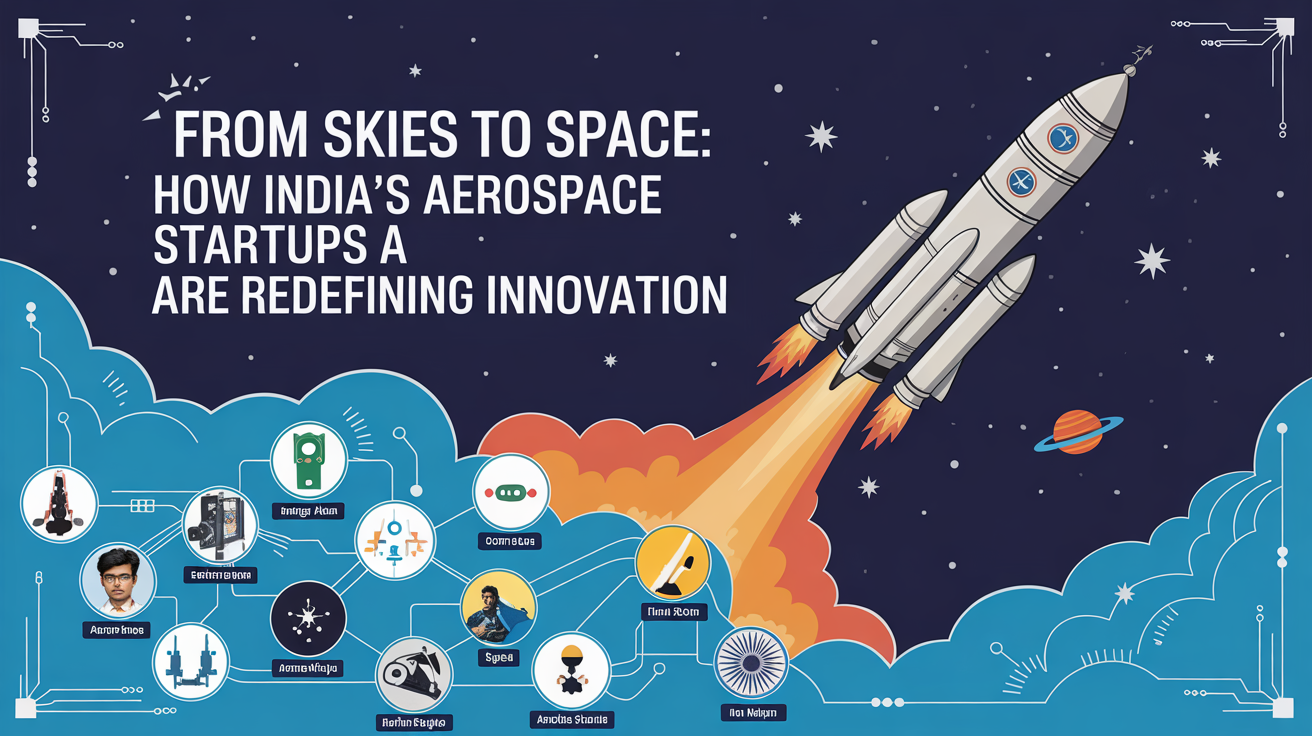India has always been a strong contender in the field of space and aviation. The great success of ISRO’s Chandrayaan missions and the jet production in the country give testimony to India’s capabilities and its ability to lead and innovate. And now a new story is being written, a story that is led by aerospace startups. These are young, dynamic companies that are rewriting the rules of the game-not just in India but globally.
Satellite launches, drone technologies, or even interplanetary ambitions—Indian aerospace start-ups are building a promising future with infinite possibilities.
Also Read: The Role of 3D Printing in Aerospace: Revolutionizing the Industry
Emergence of Aerospace Startups in India
A decade of growth in aerospace innovations, primarily due to the government policies that have been so supportive toward entrepreneurs and due to changing trends in the global space for private exploration of the universe.
Major causes for this emergence are
The reforms by the Government of India have opened doors for private players in space activities including piloting by IN-SPACe (Indian National Space Promotion and Authorization Center).
India has borne and continues to produce a large number of engineers and scientists every year, of whom many are highly enthusiastic about aerospace and are willing to take risks.
With the growing satellite internet, earth observation and drone deliveries, the is so much from the developing corners of the world for new aerospace solutions.
Initiatives such as Startup India and specific space tech incentives create a very supportive environment for successful aerospace innovations.
Revolutionizing the Sector: Leading Aerospace Startups
Several Indian startups have reserved their seats for the domestic and international arena. Here are a few such names:
1. Skyroot Aircraft
This was established by former ISRO scientists and working to develop more cost-effective and reliable launch vehicles for small satellites. Their Vikram series of rockets has created specific attention to meet the global demand for satellite launches. Skyroot also made the news as the first Indian private company to test a cryogenic engine successfully.
2. Agnikul Cosmos
Based out of IIT Madras, Agnikul is building customizable launch vehicles that can quickly and affordably launch small payloads into space.
Pixxel is working on developing a constellation of Earth imaging satellites that can capture high-frequency and resolution data.
4. Dhruva Space
Dhruva Space focuses on small satellite design and manufacture, as well as satellite solutions to an international customer base. They are working on ground station infrastructure and satellite assembly, contributing some efforts to making space more accessible.
Explore related business ideas here: www.entrepreneurindia.co
Key Areas Where Startups Are Driving Innovation
1. Affordable Launch Services
Traditional satellite launching costs are always exorbitant.
Startups with a mission to reduce costs are therefore focusing on producing lightweight, modular rockets that can be built and launched at considerably less than standard costs.
2. Satellite Miniaturization
Satellites are increasingly smaller and more powerful.
Startups are developing micro and nano satellites to serve various needs concerning communication, weather, environmental monitoring, and national security.
3. Advanced Imaging and Data
Startups such as Pixxel provide deep insights into Earth’s health using hyperspectral imaging.
This technology can identify crop diseases, monitor pollution, and predict disasters far in advance, compared to the timely intervention possible by geosynchronous satellites.
4. 3D Printing in Aerospace
Rapid prototyping and manufacturing through 3D printing are helping startups cut costs and production lead times tremendously.
Customized engines, nozzles, and satellite components are being brought into existence through rapid 3D printing within a matter of days.
5. Autonomous Drone Technologies
Startups such as Idea Forge are pushing forward with AI and autonomous drone technologies for very important purposes, like defense surveillance, precision farming, and rescue.
Challenges Facing Aerospace Startups in India
While growth has been tremendous, a plethora of challenges still exist :
Aerospace ventures require significant investments. Early-stage funding for very costly R&D projects continues to be a major hurdle.
It takes several years from an initial thought to a stage when it really gets launched or deployed successfully.
Though there have been some improvements, regulatory navigation of conducting aerospace activities in India is still complex.
Aerospace engineers with skills and a talent pool either get attracted to the foreign lands or big companies and make it tough for startups to retain these talents.
Solving these challenges will be vital for sustaining growth.
The Future: Towards What Will Be India’s Aerospace Ecosystem?
With a smart strategy, aerospace startups in India may set their goals even higher:
Deep Space Missions: Collaborations with ISRO could also set the stage for the involvement of startups in missions to Mars, Venus, or the Moon.
UAM: The era of flying taxis and autonomous air transport could arise, taking the dream into reality through Indian innovation.
Launch Partnerships Worldwide: Indian startups could become preferred launch service providers for several countries and private companies around the world.
Space tourism: Remote as it is, sometime in the future, Space travel experience could become one segment of Indian startup interest.
Conclusion
Right from the sky toward the cosmos, India finds itself on the technological edge of innovation, owing to its disruptive aerospace startups. An intelligent fusion of state-of-the-art technology with the tenets of exploration and affordability makes them not just participants in the global space race but also trailblazers. With the right ingredients in place-ground support, funds, policies-this vibrant aerospace start-up ecosystem of India will scale new heights, taking the nation and the world to the next frontier.









